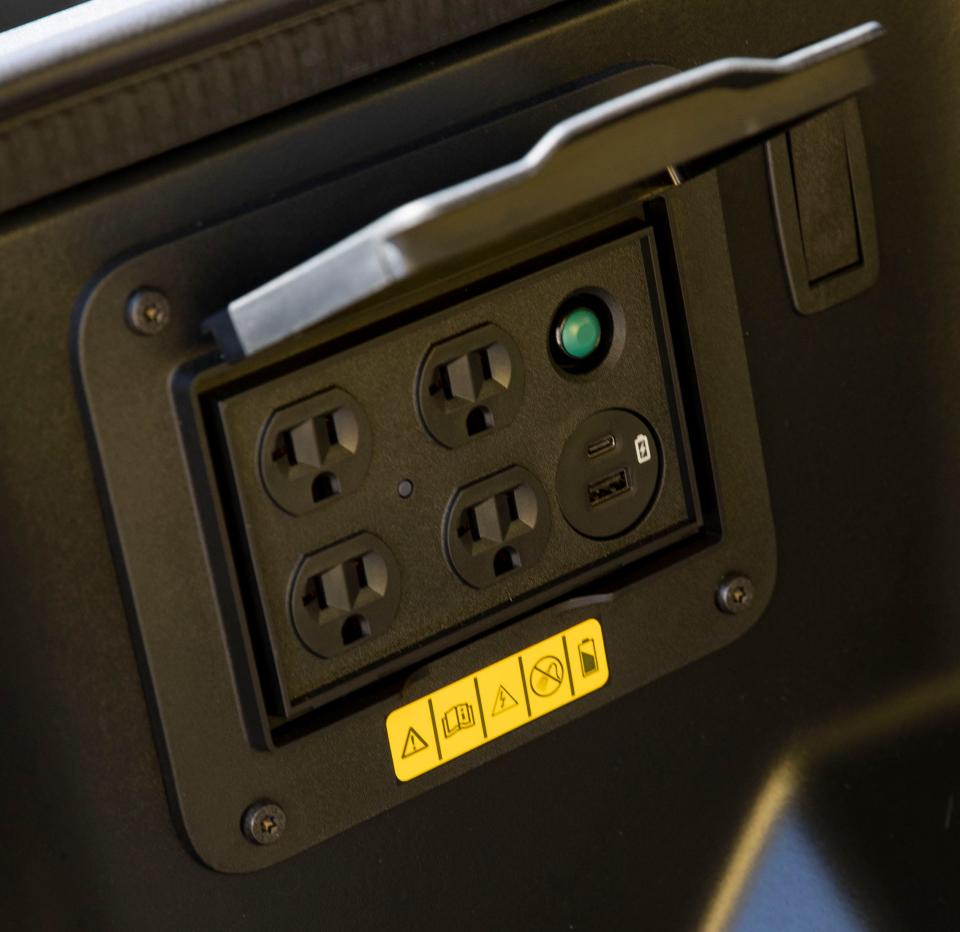Got an F-150 Lightning? Duke Energy might ask you to help keep NC's lights on in the future
With temperatures spiking and the demand for electricity following suit, California recently asked consumers to dial back on the air conditioning so as not to overwhelm the state's stressed power grid and prompt a fresh round of rolling blackouts.
In a bid to prevent similar scenarios from occurring in fast-growing North Carolina in the future, Duke Energy wants a little help from on an old rural Tar Heel stalwart, the pickup, filled with next-generation technology.
The utility giant is teaming up with Ford to launch a pilot program offering owners of the automotive company's newest pickup, the battery-powered F-150 Lightning, an incentive to let Duke access the vehicle's large battery power to boost the power grid during times of peak demand.
For $25 a month reduction in their lease payments, F-150 Lightning owners would allow Duke to draw energy up to three times per month during peak energy usage times from their electric vehicles (EVs) in the summer and winter and one time per month during the remaining months of the year for testing research purposes and to support the energy grid during hours of peak usage.

"Duke Energy is building a more intelligent, sustainable, smart grid designed to encompass growing energy demands,” said Harry Sideris, Duke's executive vice president of customer experience, solutions and services, in a release announcing the pilot program. “We’re working to maximize the benefits and potential of EVs for our customers — and initiatives like this can help reduce EV cost while supporting the grid during critical times."
Gas tax dilemma: Pay by the gallon or the mile? As more EVs hit NC roads, officials study funding options
Powering the future: Should NC's clean energy future include more nuclear power? Duke Energy thinks so
Certain technologies would be required in the pickup and at home to allow the sharing of electricity, dubbed "vehicle-to-grid" (V2G) technology, and owners would need to be enrolled in Ford's software package to participate in the pilot program, which is expected to launch next year.
Stan Cross, electric transportation policy director with the Southern Alliance for Clean Energy, said the idea of miniature mobile power plants on wheels scattered across communities is appealing on a number of levels. Supplying energy back to the grid can ease demand during peak usage and help balance power across the grid, reducing costs for all users. Furthermore, it expands renewable energy usage by utilizing untapped power.

“We need real-world projects to test and understand the grid benefits EVs can deliver, and vehicle-to-grid technology is very promising," Cross said. "It shows real possibilities and another potential value for EV consumers."
While not all EVs are viable candidates to provide power back to the grid, mid- and large-size electric vehicles like pickups, trucks and busses have the added battery capacity to provide a boost to the local grid. Besides the F-150 Lightning, which has proven so popular that Ford has extended its production run several times, other automobile companies including GM and Rivian are hustling to bring electric pickups to market that will offer bi-directional charging technology. Duke has said it expects to add more vehicles to the program in the coming years.
According to its filing with the N.C. Utilities Commission, Duke expects the pilot program to cost around $500,000. Initially, it will be available to up to 100 customers in the Duke Energy Carolinas service area, which encompasses most of Western North Carolina, including Charlotte and the Piedmont.
Duke and Ford are collaborating on a complimentary small-scale research and development test in Florida to begin in 2023.
Officials hope utilizing the vehicle batteries during peak-demand periods will allow Duke to avoid using other methods, such as turning back on mothballed coal-fired power plants, to meet demand. Using power generated by consumers is included in Duke's carbon reduction plan as part of the utility giant's effort to develop a "greener" power grid to meet the state's goals of reducing its carbon energy footprint by 2030.
Charging the future: How an international scandal is helping rural NC prepare for the electric vehicle revolution
"I think this holds real potential, a real value and possible revenue stream for EV owners if they can sell power back to the grid," Cross said. "But as an EV owner, I need to feel comfortable that doing this isn't going to harm my battery or reduce my battery's performance or damage it in any way.
"That's what this program is going to tell us."
If the pilot proves popular and doable, Duke say it hopes to roll out a permanent program in a couple years.
Reporter Gareth McGrath can be reached at GMcGrath@Gannett.com or @GarethMcGrathSN on Twitter. This story was produced with financial support from 1Earth Fund and the Prentice Foundation. The USA TODAY Network maintains full editorial control of the work.
This article originally appeared on Wilmington StarNews: Duke Energy wants to access stored power in F-150 Lightning pickups

